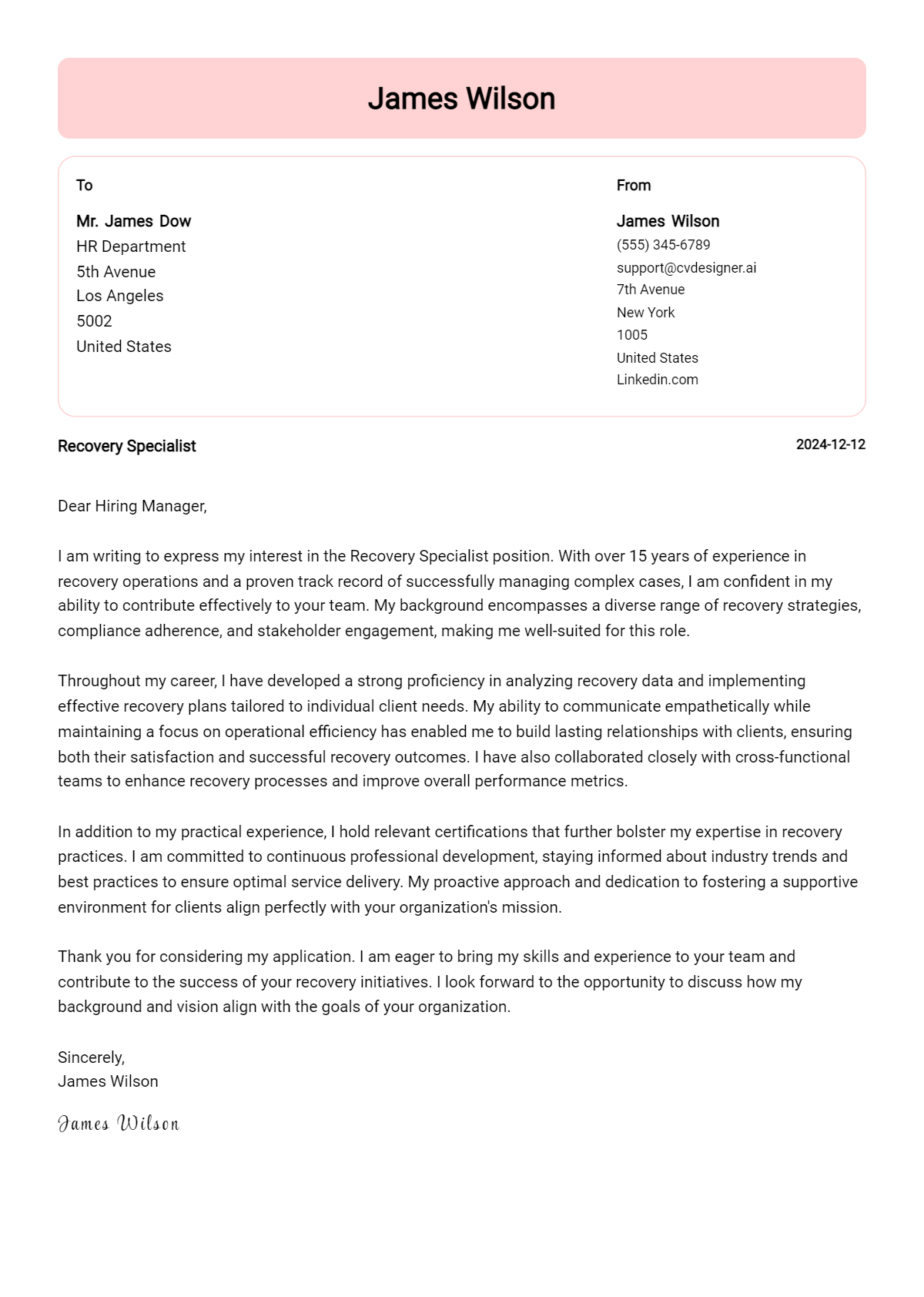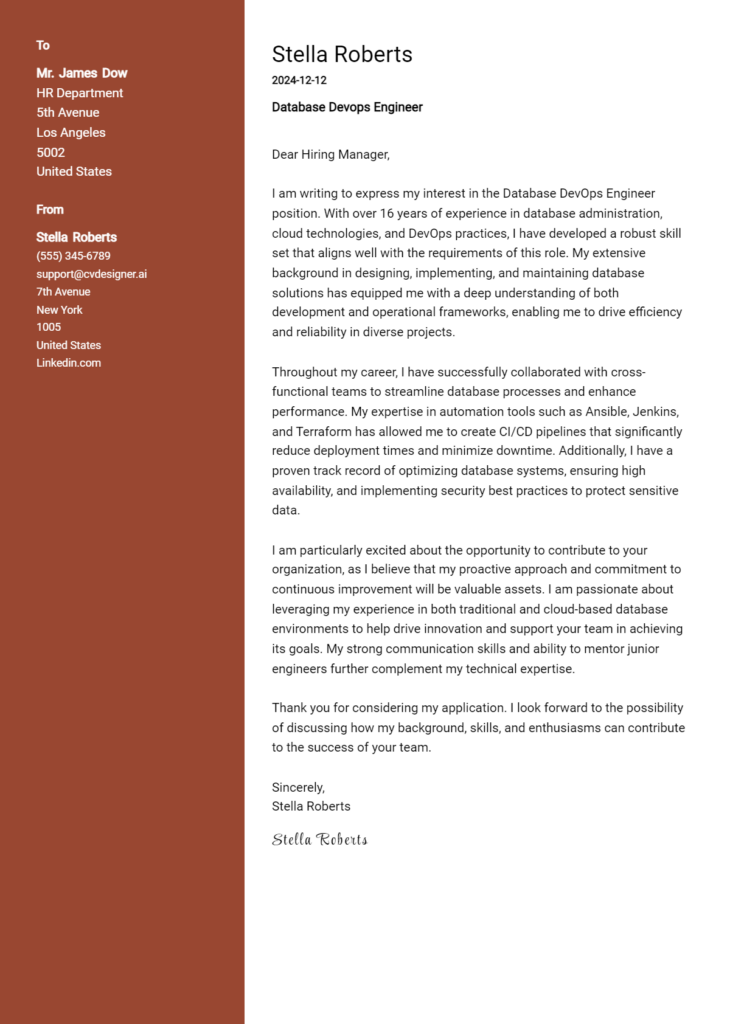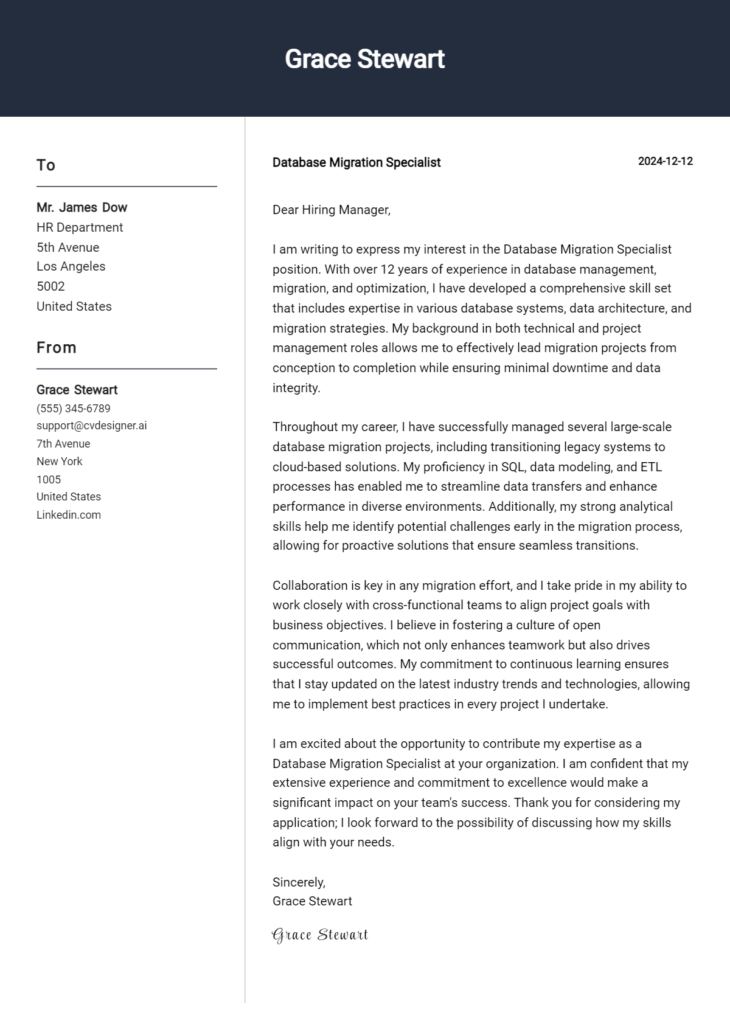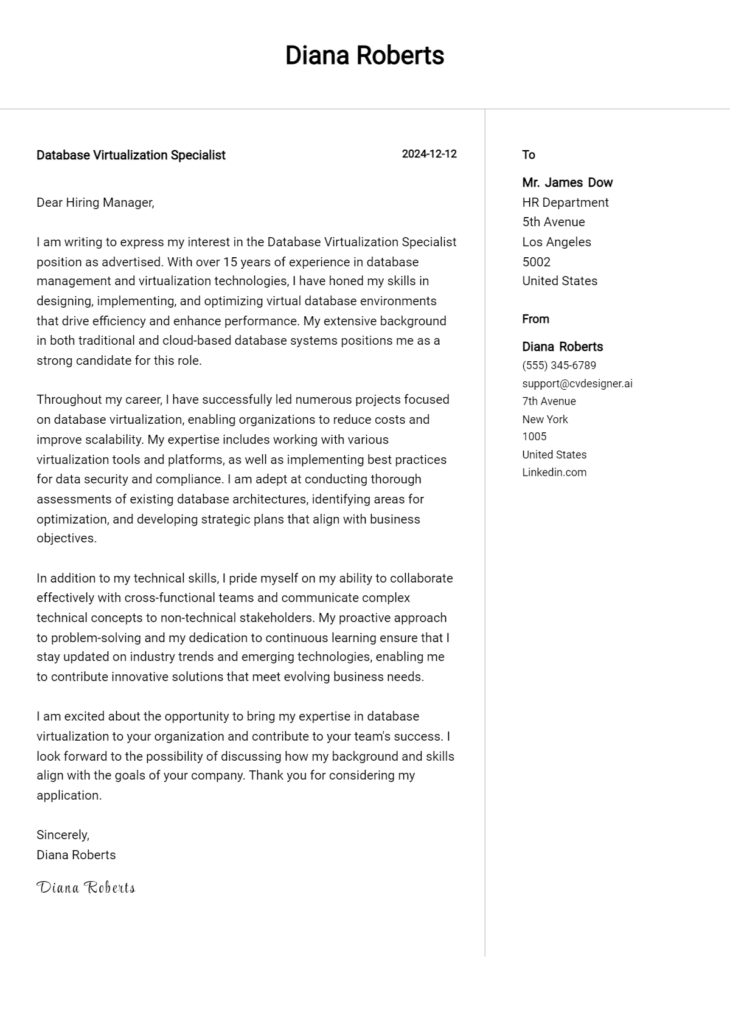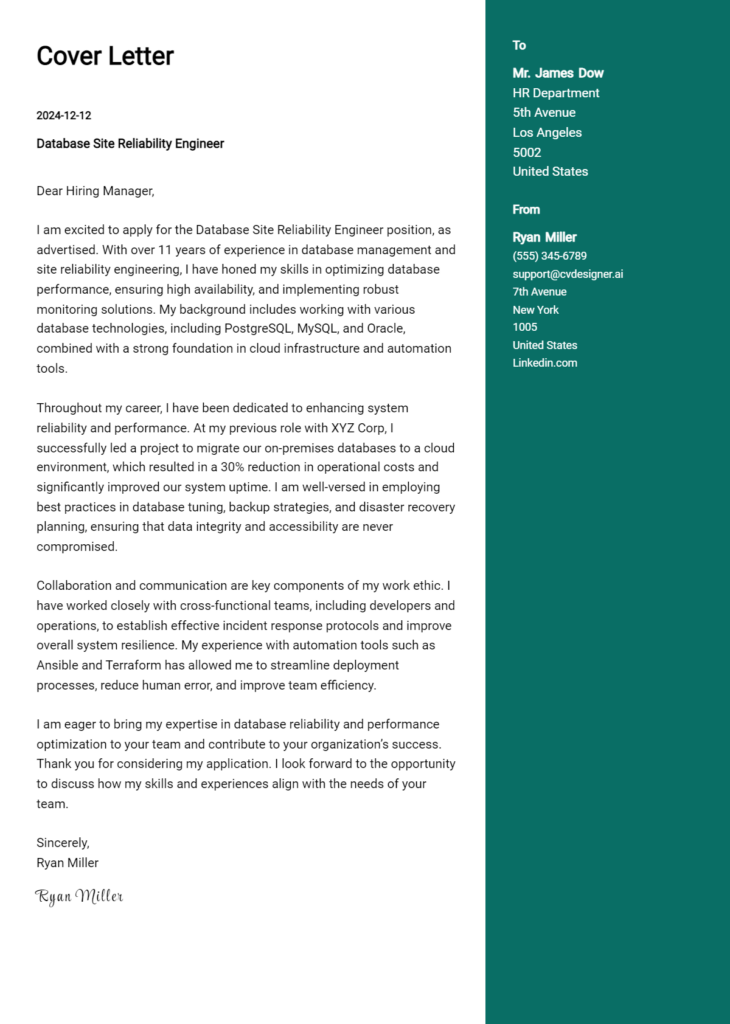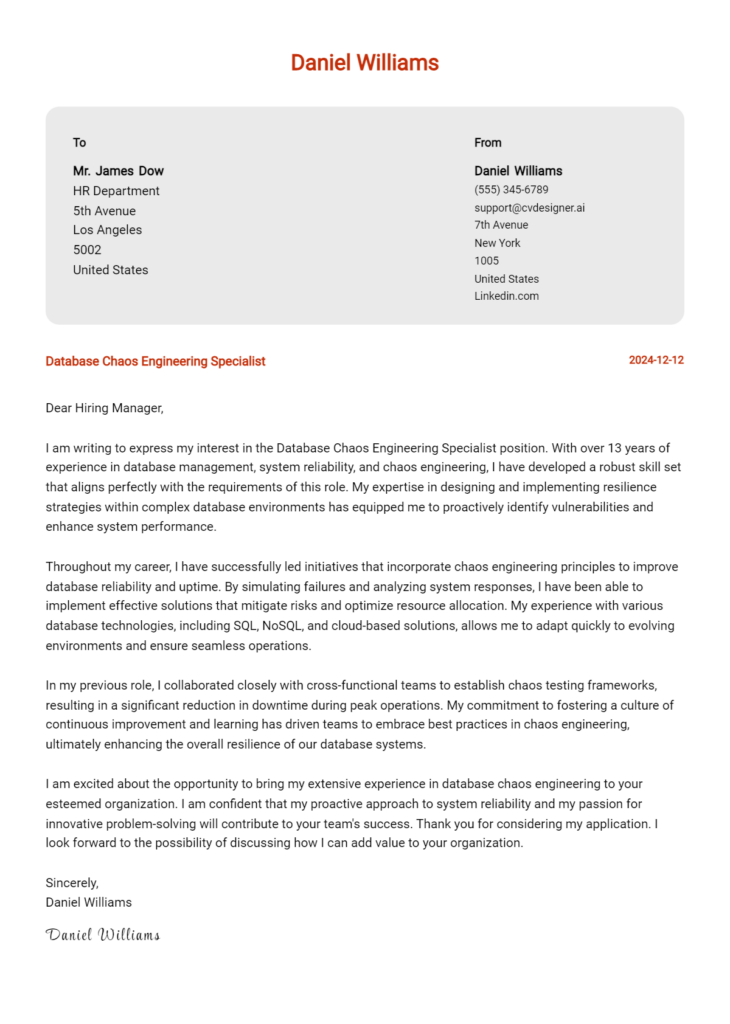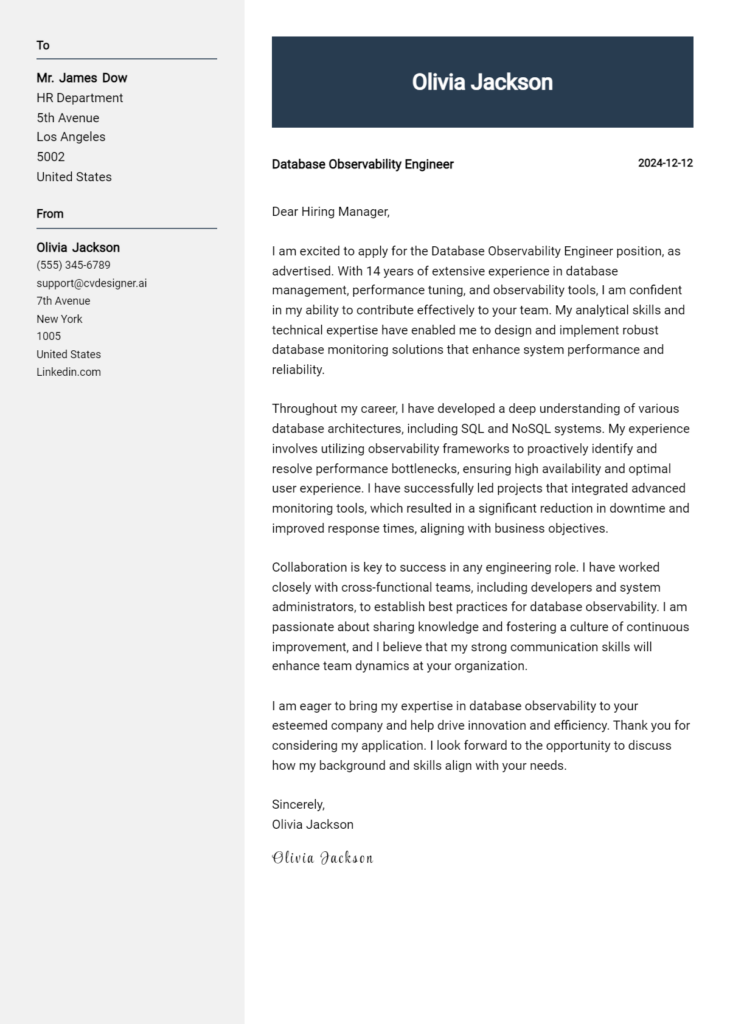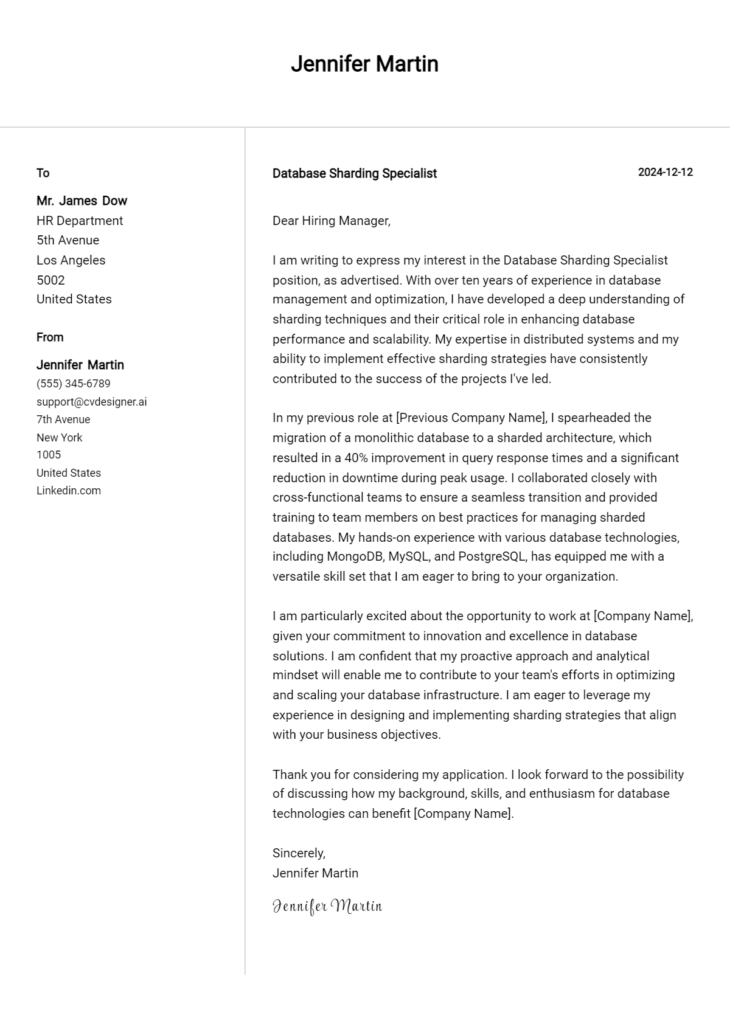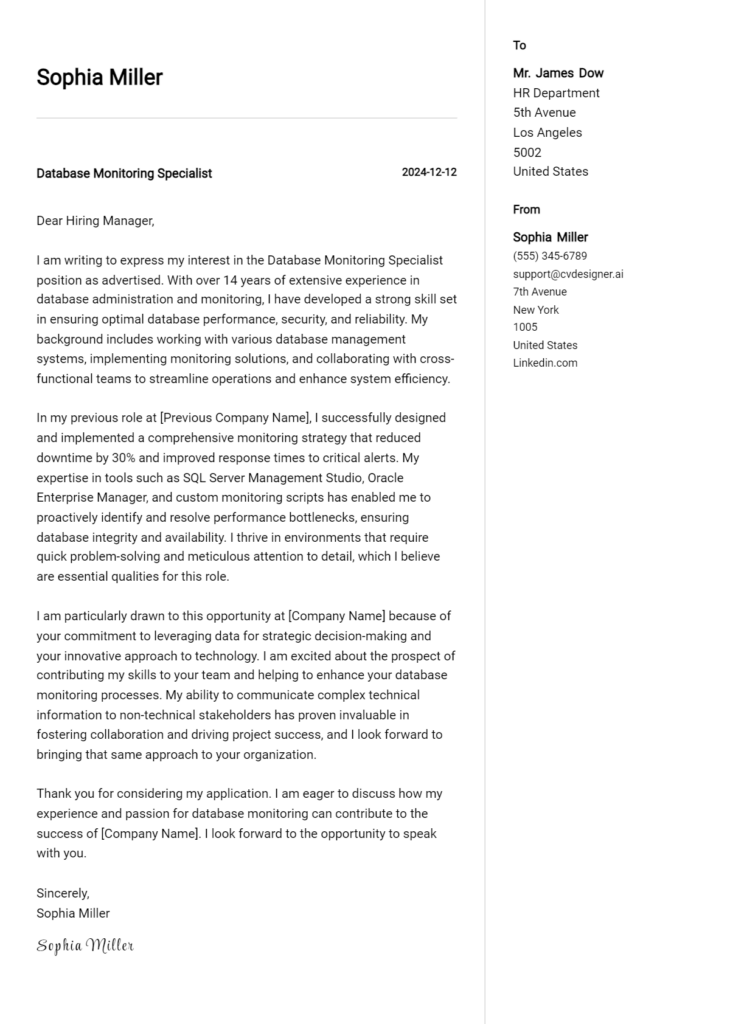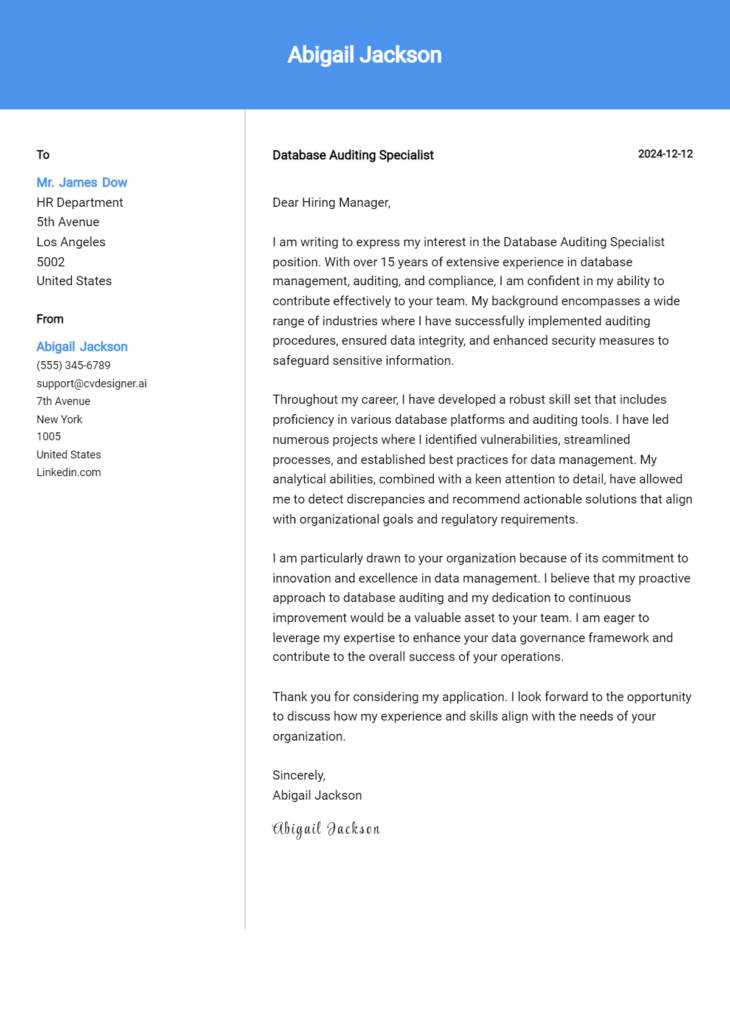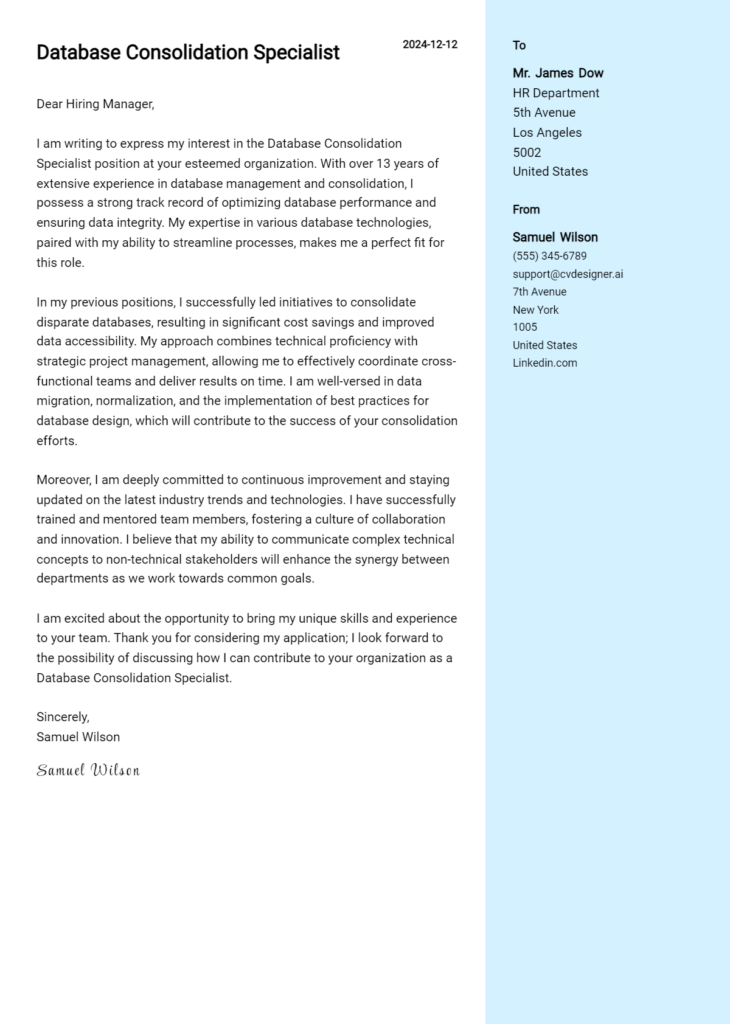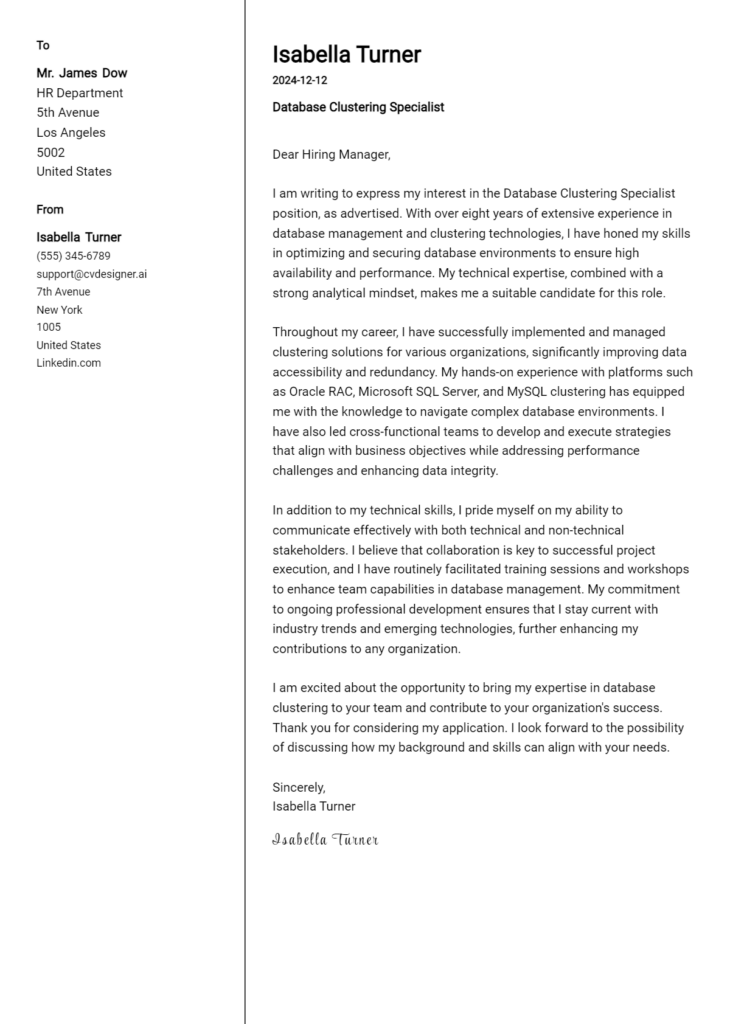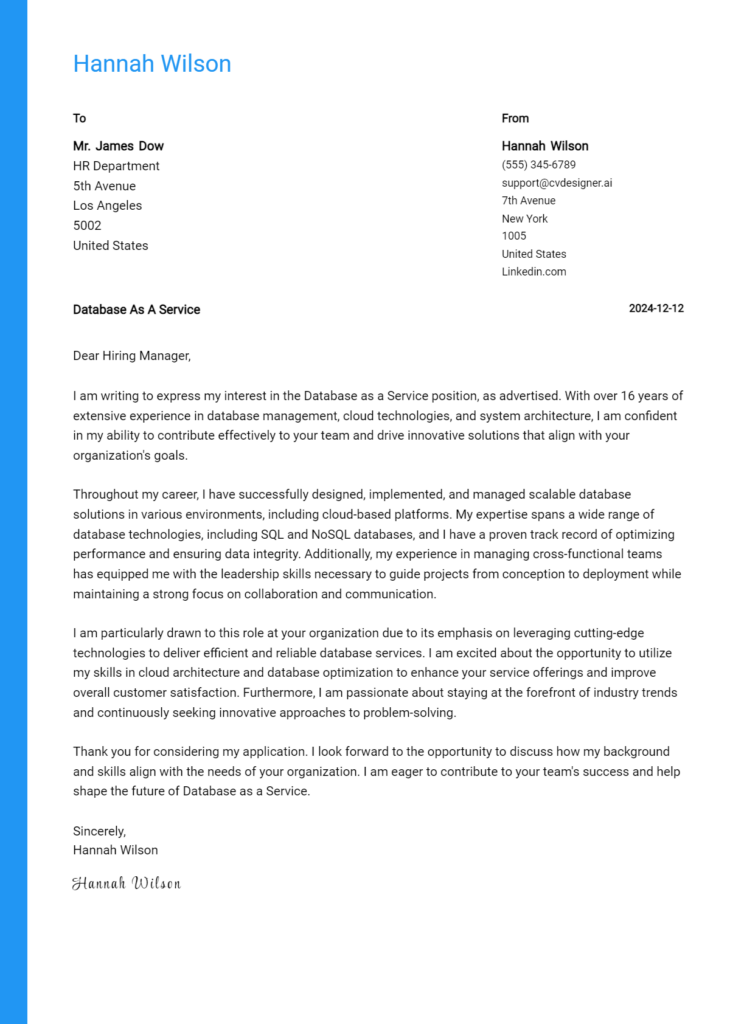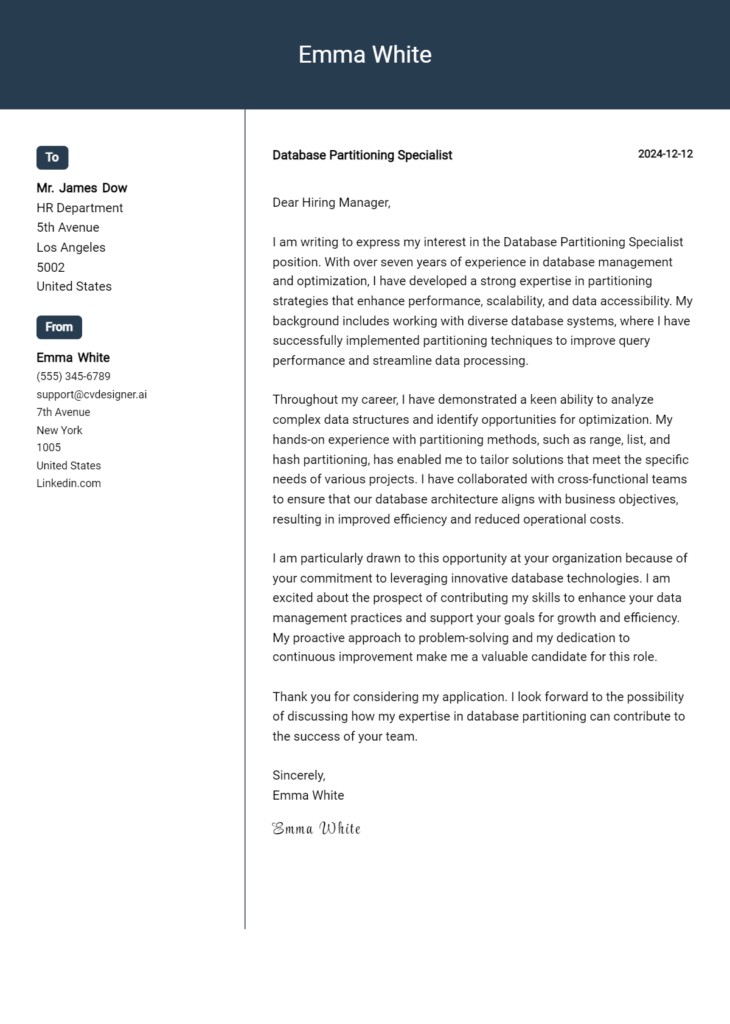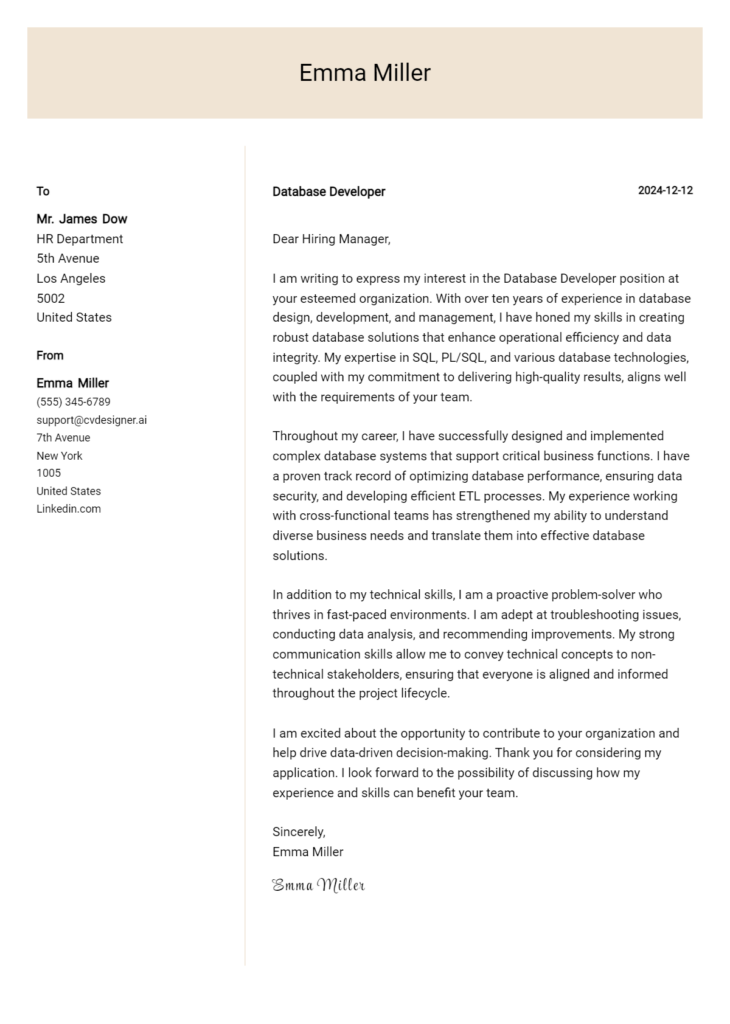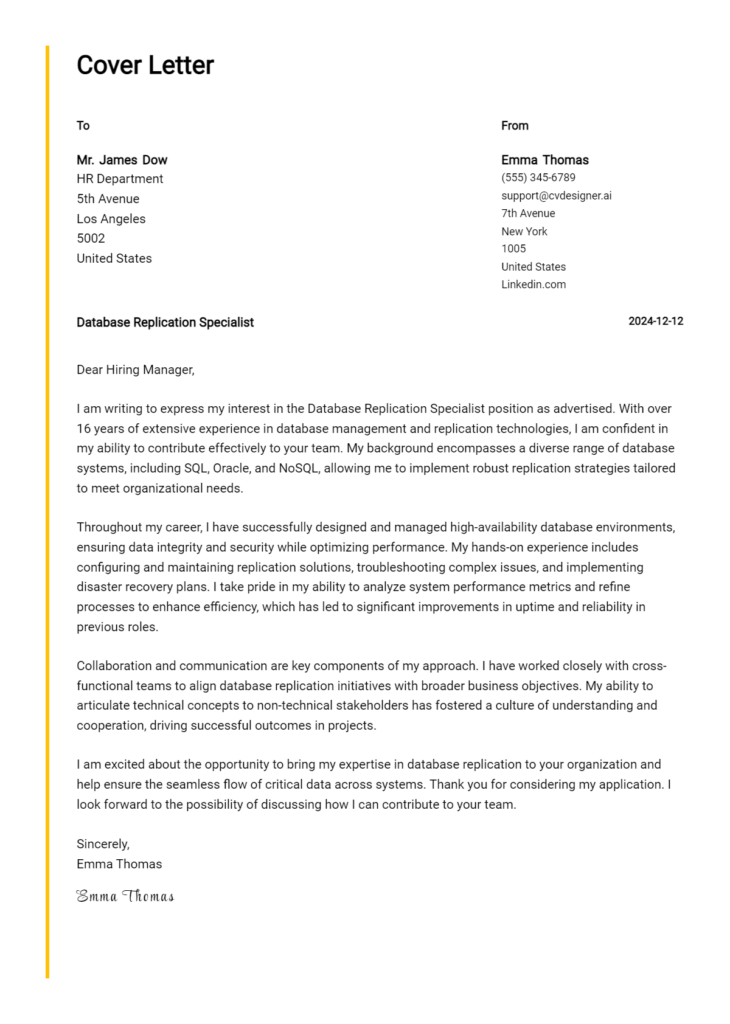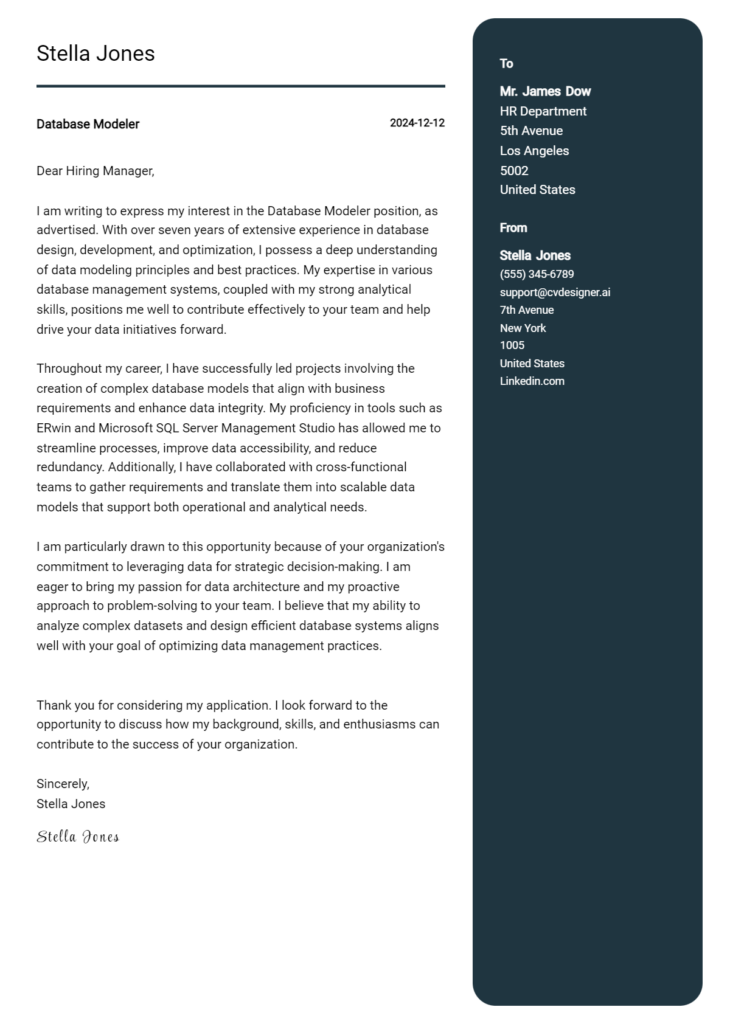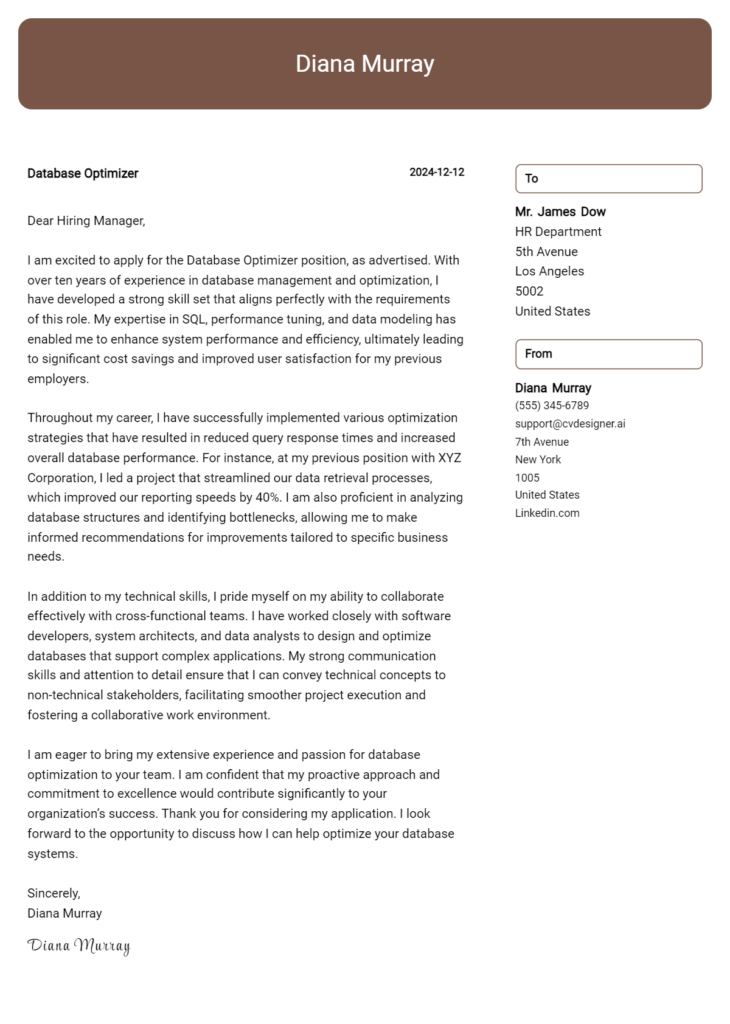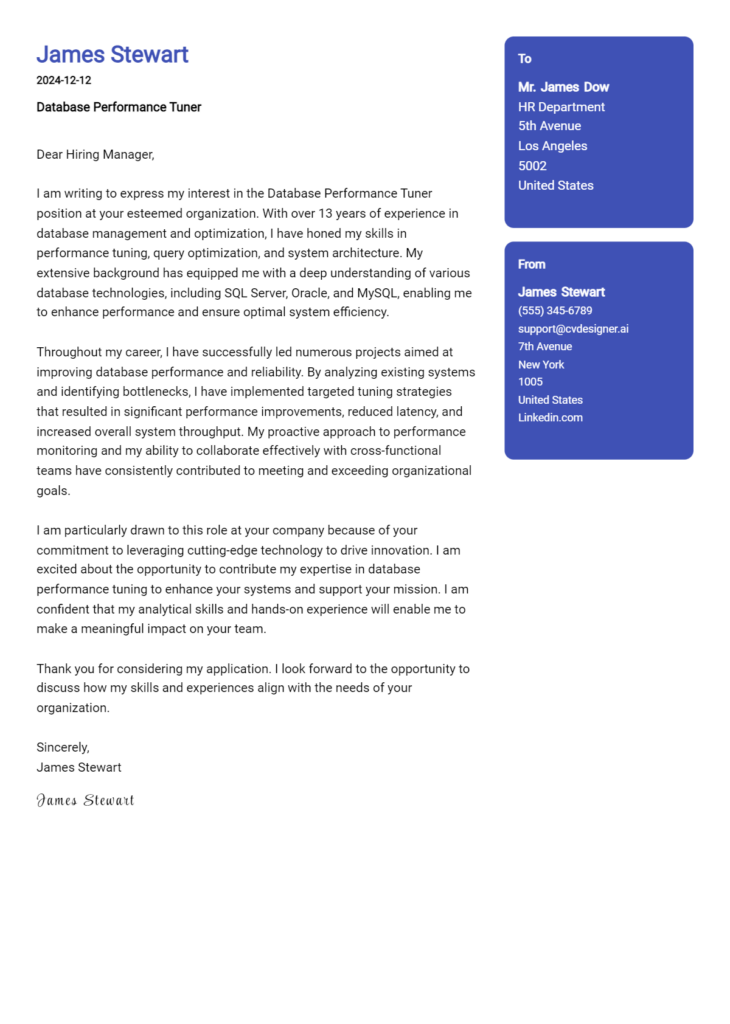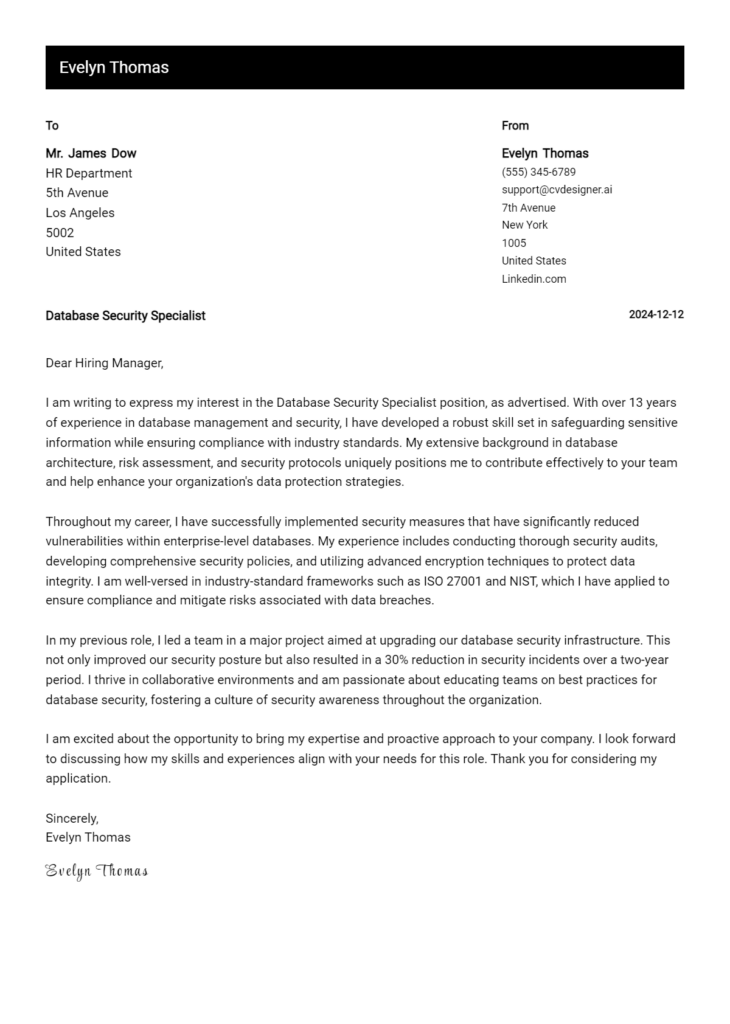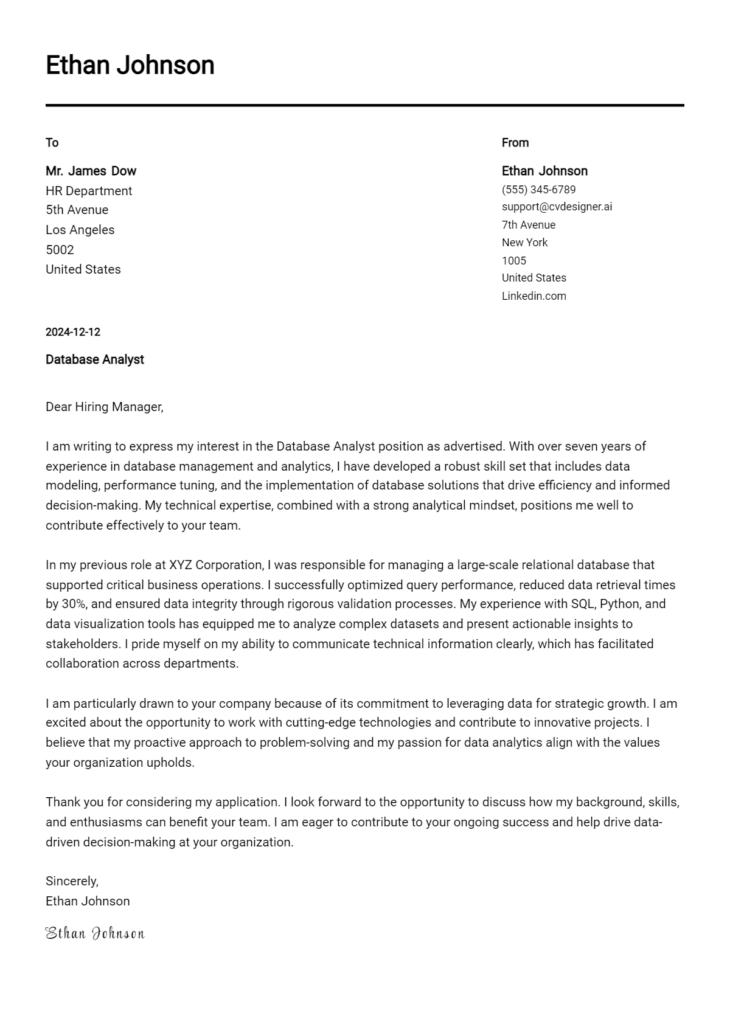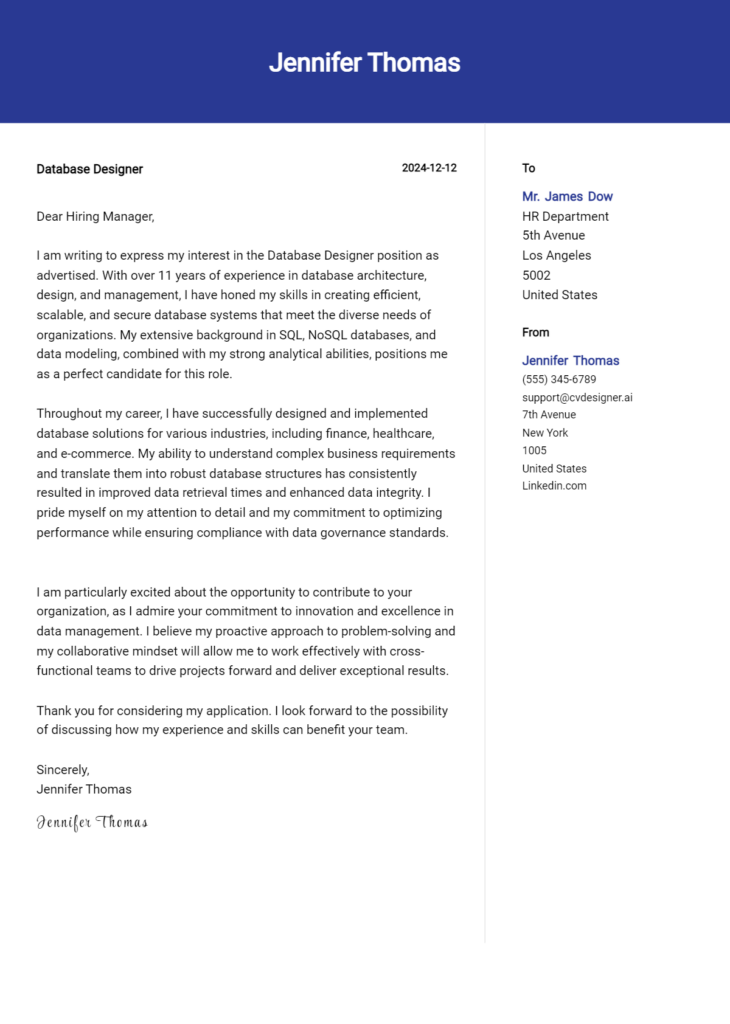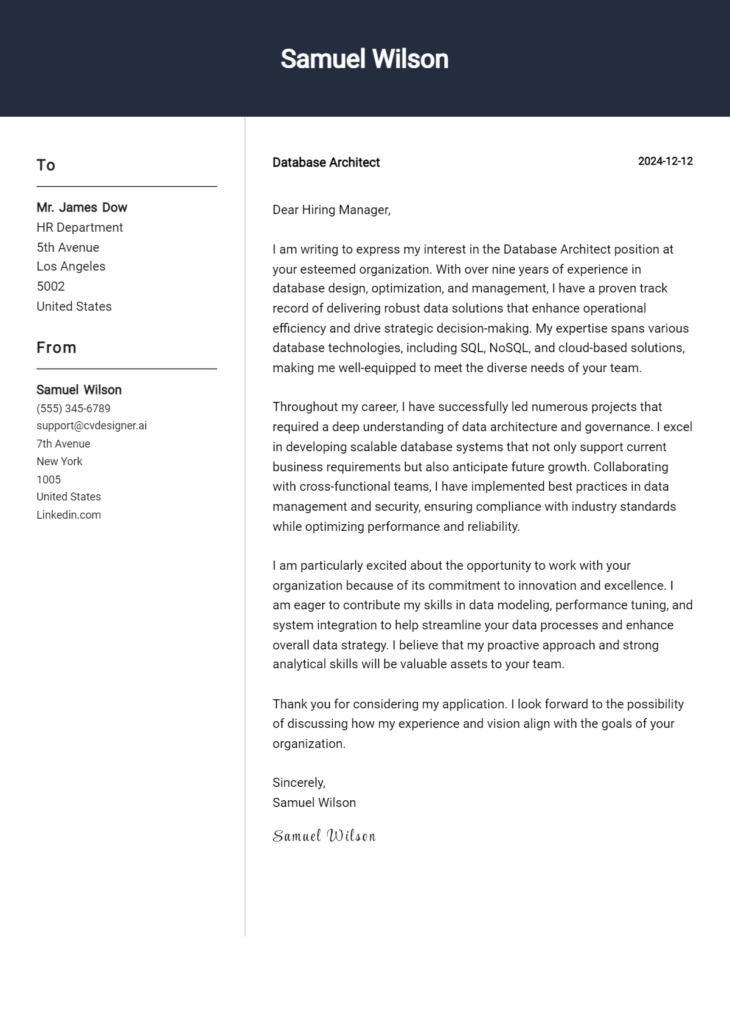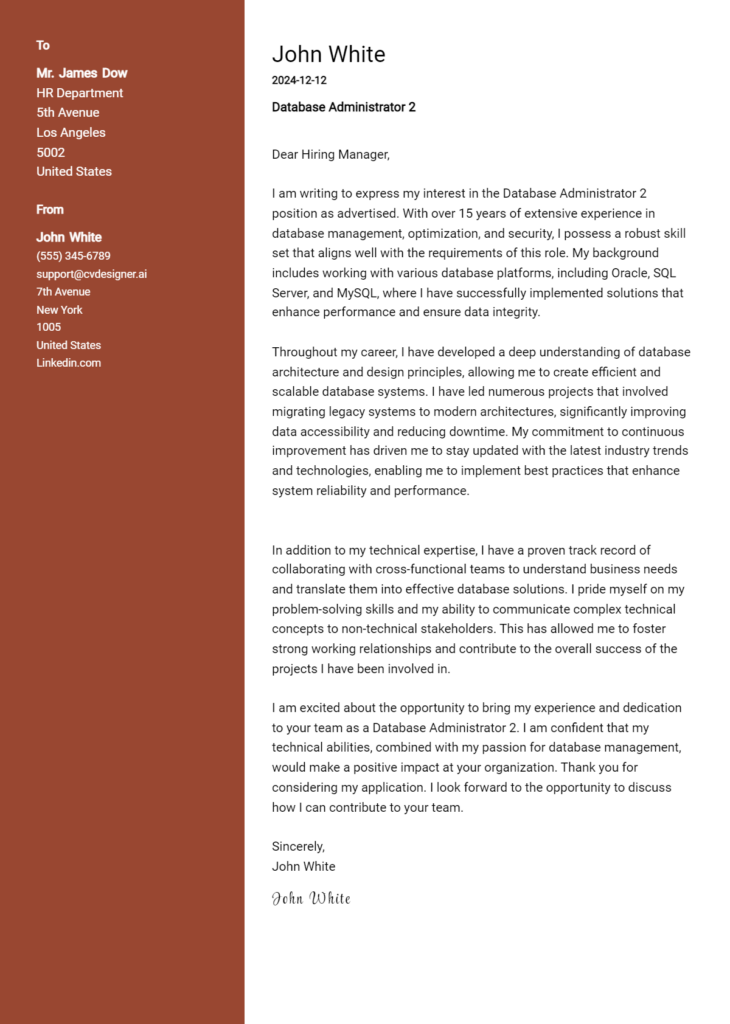Recovery Specialist Cover Letter Examples
Explore additional Recovery Specialist cover letter samples and guides and see what works for your level of experience or role.
How to Format a Recovery Specialist Cover Letter?
Crafting a well-structured cover letter is essential for a Recovery Specialist, as it serves as your first opportunity to demonstrate your commitment to helping others and your ability to handle sensitive situations. The format of your cover letter not only showcases your qualifications but also reflects your ability to communicate effectively, a critical skill in recovery roles. A polished and organized cover letter captures the hiring manager's attention and conveys your professionalism and dedication to the field.
In this guide, we'll explore how to structure your cover letter, providing specific insights and examples tailored for Recovery Specialists.
We'll focus on the essential components of a professional cover letter, including:
- Cover Letter Header
- Cover Letter Greeting
- Cover Letter Introduction
- Cover Letter Body
- Cover Letter Closing
Each section is crucial in presenting your qualifications and highlighting your commitment to supporting individuals on their recovery journey. Let’s delve into each part and discuss how to make your Recovery Specialist cover letter truly stand out.
Importance of the Cover Letter Header for a Recovery Specialist
The header of a cover letter is crucial as it sets the tone for the entire document and provides essential information at a glance. For a Recovery Specialist, clarity and professionalism in the header are vital, as they reflect the candidate's attention to detail and organizational skills, which are essential in the recovery field. The header should include the applicant's contact information, the date, and the recipient's details, ensuring that the letter is easy to identify and reference. A well-structured header helps establish a positive first impression and demonstrates the candidate's commitment to the role.
Strong Example
John Doe 123 Recovery Lane Healing City, ST 12345 johndoe@email.com (123) 456-7890 October 1, 2023 Jane Smith Hiring Manager Recovery Solutions Inc. 456 Help Avenue Support Town, ST 67890
Weak Example
John D. 123 Recovery Lane johndoe@email.com 10/1/23 To Whom It May Concern,
The Importance of a Thoughtful Cover Letter Greeting
The greeting of your cover letter serves as the initial point of contact between you and the hiring manager, setting the tone for the rest of your application. A well-crafted greeting demonstrates professionalism and shows that you have taken the time to personalize your communication. Addressing the hiring manager directly not only conveys respect but also indicates your genuine interest in the position. To make a strong impression, it is essential to avoid generic greetings like "To Whom It May Concern." Instead, take the time to research the recipient's name, which can often be found on the company’s website or LinkedIn. This small effort can make a significant difference in how your application is received.
Strong Greeting Example
Dear Ms. Johnson,
Weak Greeting Example
To Whom It May Concern,
The Importance of a Strong Cover Letter Introduction for a Recovery Specialist
A well-crafted cover letter introduction is crucial for a Recovery Specialist, as it sets the tone for the entire application. This initial paragraph should not only capture the hiring manager's attention but also express the candidate’s genuine interest in the role. Moreover, it serves as an opportunity to briefly showcase key skills or achievements that align with the job's requirements. An engaging introduction can differentiate a candidate in a competitive field, making it essential to strike the right balance between professionalism and personality.
Strong Example
Dear [Hiring Manager's Name], I am thrilled to apply for the Recovery Specialist position at [Company Name], as I am deeply passionate about supporting individuals on their path to recovery. With over five years of experience in behavioral health and a proven track record of implementing effective recovery plans, I am confident in my ability to contribute positively to your team. My dedication to fostering a compassionate environment has not only empowered clients to regain control over their lives but has also earned me recognition as an outstanding advocate in my previous roles.
Weak Example
To Whom It May Concern, I saw the job listing for a Recovery Specialist at [Company Name] and thought I would apply. I have some experience in the field, and I think I could do the job. I’ve worked with clients before, but I'm not sure what else to say.
Purpose of the Cover Letter Body for a Recovery Specialist
The cover letter body for a Recovery Specialist serves as a critical platform to illustrate the candidate's relevant skills, experiences, and the unique value they bring to the organization. It provides an opportunity to detail specific projects or accomplishments that highlight the individual’s expertise in recovery strategies, case management, and client engagement. By sharing quantifiable results and successful interventions, the candidate can demonstrate their effectiveness in facilitating recovery processes and improving client outcomes, thereby showcasing their fit for the role and potential contributions to the company's mission.
Strong Example
Dear Hiring Manager, I am excited to apply for the Recovery Specialist position at [Company Name]. In my previous role at [Previous Company], I successfully implemented a recovery program that increased client engagement by 30% over six months. By conducting thorough assessments and tailoring individualized recovery plans, I was able to help 25 clients achieve their recovery goals, significantly improving their overall well-being. Additionally, I led a team initiative that reduced the average case resolution time by 20%, enhancing our service delivery and client satisfaction. I am eager to bring my expertise in recovery strategies and my passion for helping others to [Company Name] to contribute to your mission of fostering sustainable recovery for your clients. Sincerely, [Your Name]
Weak Example
Dear Hiring Manager, I want to apply for the Recovery Specialist job at your company. I have some experience in recovery and have worked with clients before. I think I could do a good job because I like helping people. I have done some projects, but I don't remember the details right now. I believe I would fit in well with your team. Best, [Your Name]
Importance of the Cover Letter Closing for a Recovery Specialist
The closing paragraph of a cover letter is crucial for a Recovery Specialist as it provides an opportunity to succinctly summarize qualifications, express enthusiasm for the role, and encourage the hiring manager to take the next steps. A well-crafted closing can reinforce the candidate's fit for the position and leave a lasting impression, while a poorly written closing may weaken their overall application.
Strong Example
Thank you for considering my application for the Recovery Specialist position. With my extensive experience in client support and proven track record of successfully guiding individuals through their recovery journeys, I am excited about the opportunity to contribute to your team. I look forward to the possibility of discussing my qualifications further and how I can help advance your mission. Please feel free to review my resume, and I hope we can schedule a time to talk soon.
Weak Example
I hope you like my application. I think I’d be good at the Recovery Specialist job. Please look at my resume if you want. Let me know if you want to talk.
These tips are designed to help candidates craft an effective cover letter for a Recovery Specialist position. A well-structured cover letter not only highlights your relevant experience and qualifications but also showcases your technical skills, problem-solving abilities, understanding of the Software Development Life Cycle (SDLC), teamwork capabilities, and a genuine passion for continuous learning. By focusing on these areas, you can create a compelling narrative that resonates with potential employers.
Tips for Writing an Effective Cover Letter for Recovery Specialist
Highlight Relevant Technical Skills: Clearly outline your technical skills related to recovery processes and tools. Mention specific software, programming languages, or recovery methodologies you are proficient in. This will demonstrate your ability to handle recovery tasks effectively. If you're looking for inspiration, check out various cover letter templates that emphasize technical expertise.
Showcase Problem-Solving Abilities: Recovery Specialists often face challenging situations that require quick thinking and innovative solutions. Include examples from your previous work where you successfully identified problems and implemented effective recovery strategies. Use quantifiable results to illustrate your impact.
Demonstrate Knowledge of SDLC: Understanding the Software Development Life Cycle is crucial for a Recovery Specialist. Discuss your experience with different phases of the SDLC and how your role contributed to the overall success of projects. This will show potential employers that you are not only skilled but also knowledgeable about the processes that drive successful recovery efforts.
Emphasize Teamwork and Collaboration: Recovery Specialists often work in teams, collaborating with developers, project managers, and other stakeholders. Highlight specific instances where you worked as part of a team to achieve recovery goals or enhance system resilience. This can demonstrate your ability to communicate effectively and contribute positively to team dynamics.
Express a Passion for Continuous Learning: The tech field is always evolving, and showing a commitment to ongoing education and skill development can set you apart. Mention any relevant certifications, courses, or workshops you have completed or are currently pursuing. This not only reflects your dedication but also your adaptability to new technologies and methodologies.
By integrating these elements into your cover letter, you'll be better positioned to make a strong impression on hiring managers. For additional assistance in crafting your cover letter, consider using a cover letter builder to streamline the process and enhance the overall quality of your application.
Common Mistakes to Avoid in a Recovery Specialist Cover Letter
Crafting an effective cover letter is vital for standing out as a Recovery Specialist candidate. Avoiding common mistakes can significantly enhance your chances of making a positive impression. Here are some pitfalls to steer clear of:
- Generic Language: Using a one-size-fits-all approach can make your cover letter forgettable. Tailor your letter to the specific position and organization.
- Failure to Highlight Relevant Skills: Not emphasizing your skills related to recovery practices can be detrimental. Make sure to align your experience with the job requirements.
- Ignoring the Format: A poorly formatted cover letter can detract from your professionalism. Following a clear cover letter format is essential to present your information neatly.
- Typos and Grammatical Errors: Errors can create a negative impression about your attention to detail. Always proofread your letter or ask someone to review it.
- Lack of Specific Examples: Failing to provide concrete examples of your achievements can weaken your case. Use specific instances to illustrate your problem-solving skills in recovery scenarios.
- Not Showing Passion: A cover letter that doesn't convey your enthusiasm for the role can come across as insincere. Express your commitment to helping individuals in recovery.
- Neglecting a Strong Closing Statement: Ending your letter weakly can leave a lackluster impression. Conclude with a strong call to action, expressing your desire for an interview.
For more insights, you can explore various cover letter examples that demonstrate effective strategies and formats.
Cover Letter FAQs for Recovery Specialist
What should I include in my cover letter for a Recovery Specialist position?
When crafting your cover letter for a Recovery Specialist role, focus on highlighting your relevant skills and experiences. Start with a strong opening that captures the employer's attention. Mention your background in recovery services or related fields, emphasizing your understanding of various recovery methodologies. Include specific examples of how you've helped clients achieve their recovery goals, showcasing your problem-solving abilities and empathy. Additionally, detail your communication skills and teamwork experience, as these are crucial in this role. Finally, express your passion for helping others and your commitment to ongoing professional development in the recovery field.
How can I demonstrate my qualifications in my cover letter?
To effectively demonstrate your qualifications in your cover letter, align your skills with the specific requirements of the Recovery Specialist position. Use the job description as a guide to identify key competencies, such as crisis intervention, case management, or knowledge of addiction treatment. Provide concrete examples of your past work experiences that reflect these competencies. For instance, discuss a challenging case and how your intervention made a positive impact. Additionally, mention any certifications or training relevant to recovery services. Tailoring your cover letter in this manner not only showcases your qualifications but also illustrates your genuine interest in the role.
Should I include personal experiences related to recovery in my cover letter?
Including personal experiences related to recovery in your cover letter can be a powerful way to connect with potential employers, especially if they align with the role. If you have overcome challenges related to addiction or have been involved in recovery initiatives, mentioning these experiences can highlight your authenticity and passion for the field. However, ensure that you maintain professionalism and focus on how these experiences have shaped your skills and motivated your career in recovery services. Use such personal anecdotes to illustrate your resilience and understanding of client struggles, making you a more relatable and empathetic candidate.
How do I address gaps in my employment history in my cover letter?
Addressing gaps in your employment history in your cover letter requires transparency and a focus on the positive aspects of your experiences. Start by briefly explaining the reason for the gap, whether it was due to personal circumstances, further education, or other valid reasons. Emphasize how you utilized that time for personal growth or skill development relevant to the Recovery Specialist role, such as volunteering, training, or gaining certifications. Highlight any transferable skills you gained during this period and reassure the employer that you are now fully committed and prepared to contribute effectively to their team. This approach helps frame gaps as opportunities for growth rather than shortcomings.
Build your Cover Letter in minutes
Use an AI-powered cover letter builder and have your letter done in 5 minutes. Just select your template and our software will guide you through the process.

